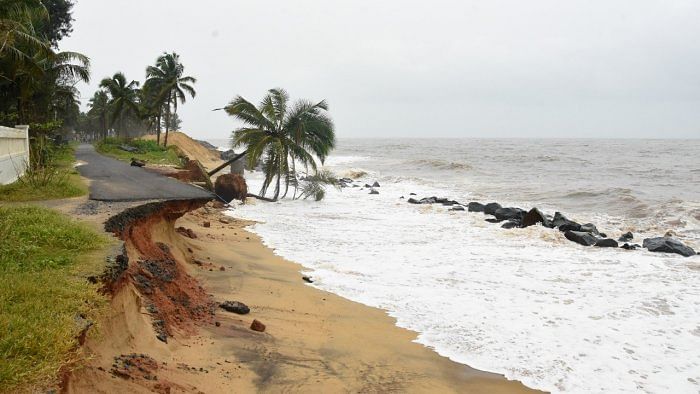
The dilution of restrictions in the coastal zone management (CZM) plans of Karnataka, recently approved by the Centre, will not only damage the coastal ecosystem but effectively hand over the coastal commons to corporate companies at the cost of the livelihood of fishing communities, warned conservationists and activists.
Karnataka's CZM plans were drawn up by the National Centre for Sustainable Coastal Management, Chennai, to exploit the relaxations provided in the Union government's new notification for Coastal Regulation Zone (CRZ) issued by the Centre in 2019.
"We have held public hearings in each of the three districts before finalising the CZM plans. The new plans lift the blanket restrictions on the 300 km coastline to help boost tourism in the coastal area to help people," a senior official and member of the board told DH.
Marine ecologist Prakash Mesta questioned the government's claim and noted that the public hearing in Uttara Kannada was conducted in the office of the deputy commissioner without creating any awareness among the people who are most affected by the new rules.
"Let alone fishermen, even an educated villager finds it difficult to visit the DC's office amid his work. The officials issued a notification in a newspaper and conducted a hearing . The fishing community and the lakhs of villagers who depend on the coast for their livelihood were never part of this consultation process," he said.
Major relaxations
The new plan incorporates the suggestion to reduce the application of CRZ regulations from 100 metres to 50 metres measured from the high tide line (HTL) towards the land. Development activities, which were once banned within 200 metre of the HTL, can be taken up as near as 50 metres from HTL in places where the population density is more than 2,161 per sq km.
Former chairman of Karnataka Biodiversity Board Anant Hegde Ashisar noted that the relaxations have come at a time sea erosion has emerged a major concern across the world due to global warming.
"In the coastal districts, encroachment near beaches is already a menace. Once you make it a commercial zone, there is nothing else to project. The new plan is the last straw for the mangroves in Uttara Kannada. Karnataka should have enhanced the protection of the 2011 rules, not abandon it this way," he said.
The CZM plan of Karnataka provides protection for 11 of the 12 eco-sensitive coastal areas. The official said that one ESZ has been excluded due to the absence of the necessary physical conditions like the mud flats. "Even for the other areas, the plans incorporate the prohibition of activities recommended by the Centre. The temporary tourism activities include setting up the stalls, washrooms, shower rooms, drinking water facilities and other least intrusive structures,” he explained.
Mesta said the increased activity will drastically affect fish breeding, crab diversity besides the general ecology of the coast. "The government is doing this in the middle of the news of disasters linked to climate change within the borders of Karnataka. Let them consult the real stakeholders like fishermen and rural folk. They will come to know the ground realities,” he added.
Activist Dinesh Holla said the government's idea of development was aimed at helping the top two companies in the country get all natural resources." In Western Ghats, people lost their natural resources and got disasters in return. In Mangaluru, we are already seeing the corporatisation of the coastal area. With the new rules, people will see the beaches fenced by big corporates in the name of development," he added.